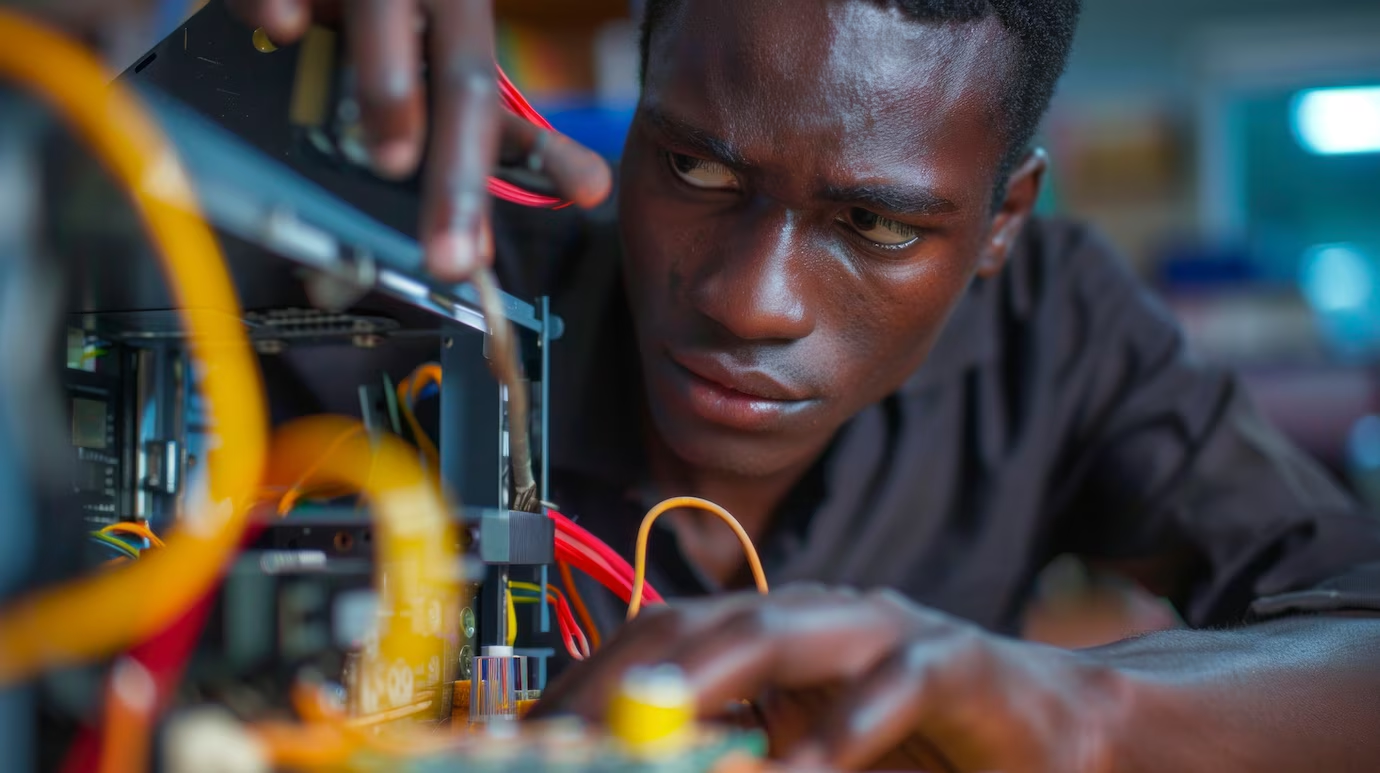Great! If you’re a student in Ghana studying electrical engineering—or even just passionate about electronics—there are many practical, low-cost projects you can start with that not only boost your knowledge as an Electrical student at IPES – Institute of Professional and Entrepreneurial Studies; but also solve real local challenges.
Some of these will be useful if you choose to work at one of the top electrical companies in Ghana such as CETECH Electrical Solutions. Here’s how you can take advantage of these project ideas with a local perspective:
🔌 1. Solar-Powered Charging Station for Mobile Devices
Why it matters in Ghana: With Dumsor (intermittent power outages) still affecting some areas, a solar-powered charging station can be a valuable solution in rural communities or university hostels.
How to start:
- Use a small solar panel (around 10W–20W), a charge controller, a 12V battery, and USB output ports.
- You can house it in a recycled plastic container or wooden box for low-cost, locally sourced protection.
- Add an LED indicator to show battery charge level.
💡 2. Home Automation System Using Arduino
Why it matters in Ghana: Automating lights and fans can help save energy, especially in student hostels or homes where electricity tariffs are a concern.
What you need:
- Arduino Uno, relay module, motion sensors or IR sensors, and a smartphone (for Bluetooth or WiFi control).
- Use it to control light bulbs or fans using your phone or based on motion detection.
🌡️ 3. Digital Temperature & Humidity Monitoring System
Local Use Case: In places like Kumasi or Tamale, where humidity affects storage of farm produce or electronics, this project can help monitor environmental conditions in real-time.
Components:
- Arduino + DHT11/DHT22 sensor + LCD display.
- Optionally, add a buzzer or GSM module to send alerts if values go out of range.
⚡ 4. Small-Scale Renewable Energy Grid for a Village
Big Project Idea: Design and simulate (using software like MATLAB Simulink or Proteus) a mini-grid that combines solar and wind energy.
Why it matters: Many rural areas in Ghana still lack reliable access to electricity. Your project can be a prototype that influences real community-based energy solutions.
🎛️ 5. LED Flasher or Voltage Regulator Circuits
Beginner-Friendly: These are excellent for WAEC or polytechnic students starting out.
Why it’s helpful: Helps you understand the basics of timing circuits (LED flasher) and voltage control (regulator)—which are building blocks for larger systems.
What to do: Use 555 timer ICs, capacitors, resistors, Zener diodes, and regulators like LM7805.
🤖 6. Line-Following Robot
Fun and Educational: Great for school projects or inter-departmental competitions (e.g., Robofest at KNUST or UENR).
What you need:
- Arduino + IR sensors + small DC motors + wheels and chassis.
- Use black tape on white surface as the line to follow.
📻 7. Build an FM Radio or Digital Clock
Useful at home: An FM radio is great for accessing local news (especially in regions like the Upper West or Volta), and a digital clock project helps you understand timing circuits.
Tools: Use ICs like CD4060 (timer) or TEA5767 (FM radio), display units, and basic soldering tools.
🌍 8. Solar Water Heater
Perfect for homes in off-grid or peri-urban communities. Solar water heating can be lifesaving in areas where gas or electric heaters are too expensive or unavailable.
You’ll need: Copper pipes, black paint (for solar absorption), a water tank, and a simple circulation system (gravity or small DC pump).
💼 Career Tip for Ghanaian Students
Working on these projects and documenting them (photos, videos, and a brief explanation), whether as IPES – Institute of Professional and Entrepreneurial Studies Electrical Study Program student or a personal hobby. They can be added to your portfolio or LinkedIn, which can help you get internships at ECG, CETECH Electrical Solutions, GRIDCo, VRA, or tech startups in Accra, Kumasi, or Takoradi.

